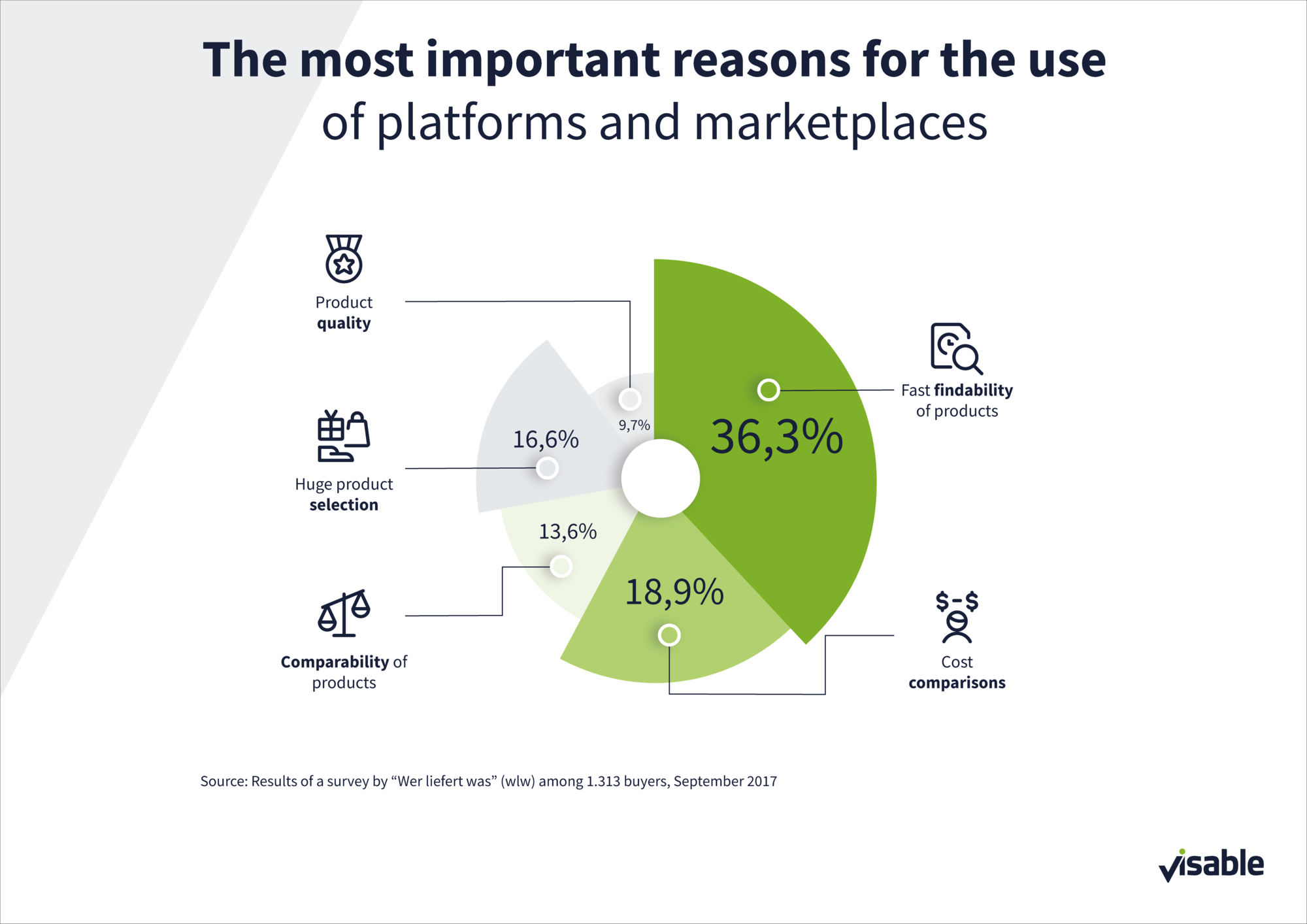With choice comes the agonising task of making the right decision. This also goes for finding the ideal channel for online sales. After all, the growth rates for e-commerce have been continually increasing for many years.

Sales strategy for B2B enterprises: which sales channel should be used?
If you want to profit from this development, you are faced with the question of whether you should invest in your own B2B online shop or use an online marketplace instead.
Numerous B2B online marketplaces such as Alibaba, EUROPAGES or wlw provide suppliers of products and services with access to the entire infrastructure for Web sales. This means they can advertise their products and services quickly and easily. What you need to know if you do not have your own online shop to date or are not listed on an online marketplace you can find here.
Online platforms provide easy entry
A huge advantage of platforms on the Internet is their low barrier to entry for tapping into new sales markets or for addressing new customers. Such marketplaces, which serve as a broker between international buyers and sellers, are usually associated with low costs and effort, but they provide ideal chances for presenting offers to a wider audience. Buyers on the other side have the opportunity to find new suppliers and contact them.
B2B marketplaces: the most important criteria
When it comes to choosing online marketplaces for providers of products and services, the following points are especially relevant:
- Reach of the platform
- Popularity and awareness of the marketplace amongst the individual target groups to be addressed
- Leeway in terms of changes and adjustments – for instance to individualise information or images of the respective offers
These three criteria are catered to by marketplaces such as EUROPAGES (with 2.4 million visitors per month) or wlw (with roughly 1.3 million visitors per month).
For each provider of products and services, it is important to consider if the target group of buyers is also spoken to on the platform and their needs are catered to. Current influences on the purchasing behaviour of buyers also play a role. Platforms which deliver the right results to their search in a fast, reliable and suitable way provide a higher value. A marketplace which intuitively and accurately provides data on the product and the company saves time for buyers, above all, and helps them to take the best purchasing decision.
An own Web shop: not suitable for everyone
Now the question arises: would an own Web shop do the job? The answer: it depends. The set-up of an own online shop is completely different from that of a marketplace. To be able to offer customers a shopping experience and, at the same time, build enough reach, the provider of products and services needs to have a certain level of specialist knowledge. This is especially due to the technical characteristics a shop must offer, often requiring the provider to engage external online specialists. This leads to much higher costs in most cases than a profile on a marketplace, which is why many providers today put off creating their own online shop.
Advantages of an own Web shop
An own Web shop also provides lots of potential. For instance, it can improve the brand’s awareness or further develop sales. What’s more, the behaviour of buyers on an own website can be analysed better than on a third-party website. All in all, these results help to promote the brand stronger or to build it up.

An own Web shop: not suitable for everyone
Now the question arises: would an own Web shop do the job? The answer: it depends. The set-up of an own online shop is completely different from that of a marketplace. To be able to offer customers a shopping experience and, at the same time, build enough reach, the provider of products and services needs to have a certain level of specialist knowledge. This is especially due to the technical characteristics a shop must offer, often requiring the provider to engage external online specialists. This leads to much higher costs in most cases than a profile on a marketplace, which is why many providers today put off creating their own online shop.
Advantages of an own Web shop
An own Web shop also provides lots of potential. For instance, it can improve the brand’s awareness or further develop sales. What’s more, the behaviour of buyers on an own website can be analysed better than on a third-party website. All in all, these results help to promote the brand stronger or to build it up.
Web shop vs. B2B marketplace: conclusion
A recommendation for an own online shop or for a profile on a B2B marketplace is difficult to make. Each has their pros and cons that need to be considered. It is therefore especially important to create in advance a comprehensive strategy for your enterprise’s e-commerce division.
In the process, the characteristics of the respective target group need to be taken into account. Today, customers place high expectations on their shopping experience or the user-friendliness of an e-commerce platform. Which channel is right for you depends on how strong these expectations are pronounced.
For enterprises whose brand presence is not very strong, a profile on an online marketplace is ideal for profiting from its reach. Enterprises with enough expertise for overcoming the barriers of building up an own online shop should also bank on an online presence for analysing their customers’ behaviour and being able to maximise sales. In the end, though, each enterprise must find the right solution for their strategy.
